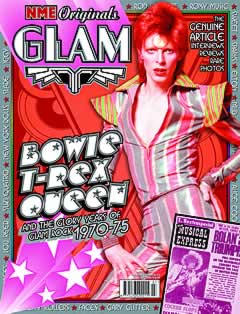July 29, 2004
Glampirism
 |  |
This post arose from a chance conjunction. First of all, a couple of days ago, I bought the tremendously enjoyable NME Originals Glam special, which reproduces all the major articles on T-rex, Bowie, Roxy, Rod, Elton etc etc from the NME and MM in the early 1970s. Then, yesterday, somewhere in the interstices of Mark S's epic on noise, I stumbled upon this:
“Glam took vampire hunger as its counter-ideal to [Woodstock’s] affirmative Aquarian love-in, and reflected the Undead’s reproduction strategy — a recruitment drive thick with mutual hostility, manipulative envy, sentimental denial and endless role reversals — straight back into the fan-star relationship it was so pitilessly modelling.”
Glam as vampirism?
Yessssssss
My saying last week that Ferry was the seventies icon was of course wrong - or rather wishful thinking. (But you knew that). The definitive 70s icon was Bowie, naturally. I've never warmed to Bowie, which is the same as saying: Bowie never really chilled me, got under my skin, possessed me... I like all Bowie's seventies records but only Low's Hockneyesque swimming pools, Solaris highways and subterranean grottoes really gets to me.
Two things are clear from reading the articles collected in NME Originals:
1. We've all got Bowie memory implants. Our version of the late 60s, the account punk gives of its precursors - the Stooges, the VU - is the past that Bowie assembled for us.
2. As Simon maintained a while back, punk was part of the glam continuum; the 'break' betwen glam and punk looks chimerical.
In many ways, and leaving aside his fashion statements and his gender ambivalence (both much more radical, much more important, than most of his music), Bowie functioned - sonically - as a force of reterritorializion. Before I get leapt on, this wasn't to do with his popularizing of the avant garde . On the contrary. It was to do with his fixating upon the most deterrorialized, most intense elements, and ushering them back into the fold of r and r and melody. Compare his pedestrian and, for me, surprisingly plodding productions of Reed and Iggy with the fissile, molten rock Cale wrought for the Stooges, or the glacial volk he created for Nico. But those very moments of incorporation couldn't help but inspire a movement in the opposite direction : listeners sent off on voyages of discovery, flights from the self, invention of artificial identities...
So how about moving the key dates forward and backward a little? Let's shift the start date back from 76's fundamentalist r and r cul-de-sac to the existentialist concept space oddysey rock of 71's The Man Who Sold the World. (There's a case for saying that seventies Bowie just flipped from one Kubrick to another: from 2001 to A Clockwork Orange.) And then forward - to 1980 - to something like Ultravox's 'Mr X' - which gets garbled/ translated/ pirated into Cybotron's 'Alleys of your Mind', and thereby joins another continuum.
As for when/ where the glam continuum dies? How about Tony Scott's The Hunger (1983)?
Scott doesn't make many films but his next feature would be --- as you all know --- 1986's Top Gun. If you want a thumbnail summary of the differences between the 'two eighties', the hyper-intense machinoid glam eighties that was, really, no more than the end of the seventies, and the shoulder-padded PoMo eighties, you need do no more than reflect on the contrast between those two emblematic films (funny how/ when the two utterly incommensurate ends of the decade get treated as continuous - cf VH-1's 'We Love the Eighties' this week). (And if you want another symbol of the PoMo Eighties, there's of course the horrendous Absolute Beginners, a film so nightmarishly bad it has Bowie reduced to hawking himself as a precursor of soulcialism, for fuxake!)
(btw Tony's decline was faster than his brother, Ridley's, but Ridley's was ultimately just as calamitous. Ridley hasn't made even a memorable film since Thelma and Louise which couldn't be considered anything close to great.)
But The Hunger was luxuriant art cinema posing as mainstream entertainment; and it's art was viciously Baconoiod. There probably hasn't been a better vampire movie. (Certainly not since: Copolla's Dracula embarrassingly failed to capture the musky aristo decadence of which The Hunger so effortlessly reeked - I mean Deneuve, Sarrandon and Bowie versus Keanu and two of the biggest hams ever, Gary Oldman and Anthony bloody Hopkins - and as for Jordan's pantomimic Interview with the Vampire, all I'll say is: Pete Postethwaite's French accent.)
The Hunger was - yes - a glam valediction.
It's said that, in Bowie's two best onscreen 'performances' - in The Man Who Fell to Earth and The Hunger ( and let's not sneer, so what if he can't act?) - he does nothing but plays himself. (But what was Bowie's 'self' then?) In fact, these perfomances were all about the Glam Look: first the Alien, then the Vampire. Bowie's great art, after all, lay in embodying worlds; that's different from raiding the dressing up box for new ways of tarting up the same underlying subject (a la Madonna) There was a terrifying soullessness about Bowie, appropriately...
The man who - contra Dorian Gray (which The Hunger updates), contra the received vampire mythos - far from having no reflection, (un)lives only in looking glasses, photographs...
In our understanding of it, the vampire is, in the end, a nineteenth century figure. It was one of Marx's favourite metaphors for Kapital/ists. But the vampire was also a profoundly Nietzschean figure: the aristocratic ubermensch (Bowies homo superior) drawing strength from the inferiors it honours by feeding upon.
(Hold on for Carmodism):
The Hunger , then, came out in the year in which Mrs Thatcher won her second term, consolidating the final phase of the long-drawn out British bourgeois revolution and preparing the way for the final, fatal routing of both the industrial proletariat and the diseased remnants of the aristocracy. It marked the end of both the (aristocratic) art film and the (proletarian) pulp genre flick. (Deneuve's involvement is a kind of return, too, since she starred in Polanski's masterpiece of 60s Brit-Art Psych-Horror, Repulsion.)
Finally, I must share with you some gems from the NME special:
Bowie, 14 August, 1971: 'I mean, I've reached the age of 24. How can anyone be a serious pop artist at 24?'
Melody Maker, 22 January, 1971, a live T-Rex review on the same page as an ad for Clockwork Orange
Elton, 11 March, 1972, 'I hate showbiz.'
Ferry, 1 July 1972, 'Someone like Picasso develops a style and flogs it to death. Marcel Duchamp was a kind of will o' the wisp of art, lending his hand to all kinds of activity - which one would wish to emulate. Warhol's idea is to make art with as little effort as possible - he's an ideas man, really. And if you have faith in an idea, it is easy to make it happen.'
Nick Kent on the uncommunicative, unsmiling (plus ca change) Lou Reed, 14 October, 1972, 'He resembles a model of himself.'
Charles Shaar Murray on 'For Your Pleasure', 24 March, 1973, it 'ends with some amazing Eno-ing, and the tailwind of asteroids buffeting your ears.'
CSM on Ferry, 10 November 1973, 'Sounding more like a Pakistani Lou Reed than ever...'
Posted by mark at July 29, 2004 08:24 PM | TrackBackWell you could argue that Bowie invented "soulcialism" with Young Americans, for me by far the least durable of his '70s albums.
But full marks for avoiding mentioning B****n E*o anywhere in your post, even though he is the answer to most of the questions raised in it.
Posted by: Marcello Carlin at July 30, 2004 08:11 AMI get the soul fhing with Young Americans but not the socialism really....
As for Eno, his involvement with Bowie went beyond the cut-off point of the NME Glam special... You could argue that Bowie and Eno worked together when both were in flight from rock (if not glam)....
Posted by: mark at July 30, 2004 10:29 AMThe "soulcialism" of Young Americans - "Do you remember your President Nixon?" etc.
Haven't read the NME Glam special, and have about as much desire (hah!) to do so as I have to read, say, Brick Lane by Monica Ali, but does it mention Warm Jets or Tiger Mountain? Bet it doesn't.
Posted by: Marcello Carlin at July 30, 2004 10:43 AMThink yr being a bit curmudgeonly there MC --- after all, it isn't writing, God forbid, by current NME hacks, it's the original articles by Ian Macdonald, CSM, Nick Kent --- so a real delight --- esp for those of us too young to remember :-)
You're right that Eno gets short shrift; including something on him wd mean cutting one of the 110 Bowie articles lol ... tho, tantalisingly, there is an NME Eno cover reproduced....
You're also right that there's a line through Eno that cuts out the Pistols altogether. Who was it, after all, who produced the first Ultravox lp?
Posted by: mark at July 30, 2004 11:38 AMAND No New York!
I don't suppose the NME spesh has found it in itself to reprint The Article That Got Me Started, i.e. IMac's Low review (or indeed his epic Eno interview later in '77)?
Posted by: Marcello Carlin at July 30, 2004 11:53 AMBeyond the purview --- it cuts out in '75 ----
Posted by: mark at July 30, 2004 12:05 PMThese cheapo compilations are one benefit of NME's brand-expandin'/core-audience diminishin' MO. How long before the Morley/Penman years are covered? For the likes of me (sharing a b'day with Estelle) it's a mouthwatering prospect.
Posted by: HKM at July 30, 2004 12:14 PMOh I WISH! And the best of the rest from that period, e.g. Danny Baker's brilliant review of Chic's Risque, Barney Hoskyns high on the Birthday Party and the Fall...but no doubt IPC Media will regard that as not being a "sound commercial proposition" bah.
Posted by: Marcello Carlin at July 30, 2004 12:16 PMGoing on that not very good book about music journalism Danny Baker's stuff sounds righteous.
Posted by: HKM at July 30, 2004 12:24 PMdunno about that, postpunk is probably feted enough now to make one possible...I hope so anyway.
There is a brilliant (and impenetrable, with some amusing white rastaisms) Penman Slits review in the punk one though.
(oh and I'm thick, who is the picture of above, next to the cover?)
bah i keep meaning to post the S&S glam piece to Stone Lanes that that vampire quote actually comes from (haha mark s quotes mark s: so much for authority!!)
i shall do it this weekend without fail (or possibly knowing me - and trig brother - WITH fail)
Posted by: mark s at July 30, 2004 03:26 PMcoppola's dracula is fantastic, wtf. tho i guess my uh take on culture is more high-lipid sunburned middle america, so such a flailing overcooked item rings truer. just check the intros: peter murphy vs armor made of beef jerky
Posted by: geoff at July 30, 2004 04:04 PMsome of those pieces (eg barney's) may be available at rockspackpages - it's subscriber only but still cheaper than buying a book (unless the book is secondhand)
Posted by: mark s at July 30, 2004 04:21 PMThe picture is Bowie in The Hunger btw
mark s, make sure you give us the URL WHEN you post the glam piece...
it's here, ie on sparks in stone lanes main page (though it will move to its own page at some point) (pitas is a bit primitive blogwise)
Posted by: at August 1, 2004 07:54 PMbah that wz me = mark s
Posted by: mark s at August 1, 2004 07:55 PM